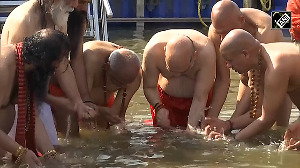Part I: Oil firms pocket Rs 2 on every litre of petrol, diesel
It's a multi-crore vanishing act that has been pushing up petrol prices for years. Over 30 years the government has collected Rs 50,000 crore (Rs 500 billion) from the public as a cess for the development of the state-owned oil industry.
But only Rs 902 crore (Rs 9.02 billion) have been allocated to the Oil Industry Development Board that is supposed to disburse the money to the industry. In fact, the OIDB has not received any money from the government since 1990-91.
Despite this the government doubled the cess on indigenously produced crude in 2002 from Rs 900 a tonne to Rs 1,800 a tonne. What happened to the money?
It went straight into the Consolidated Fund of India -- the main fund from which the government spends money -- and helped the government to bridge the fiscal deficit. The finance ministry, which doubled the cess, was presumably aware that no money had been handed out to the OIDB for 11 years.
"It is shocking that this has been going on for the past 30 years. The government has been collecting money without really putting it to the use it is intended for," says an oil industry expert.
The government has reaped a rich dividend from hiking the cess. It raked in about Rs 2,880 crore (Rs 28.8 billion) in 2001-02. In the next year (2002-03), after the cess was raised, that climbed to almost Rs 6,000 crore (Rs 60 billion). It raised around the same amount in 2003-04.
How much would it affect the consumer if the cess was abolished? Petrol and diesel prices could come down by around Rs 1.50 a litre.
The fact is that times have changed since 1975 when the government imposed the cess on the grounds that the state-owned oil companies needed financial assistance to step up their self-sufficiency drive.
Nowadays, the oil companies require thousands of crores for development activities -- but they raise the money from the market.
"Yes, not many industry members come to us for loan. These days they get cheaper loans from the market," says OIDB secretary B Sam Bob. While the oil companies are able to raise short-term funds from the market at 5 per cent interest, the OIDB charges a minimum 6.5 per cent.
For its part, the OIDB has been disbursing relatively small sums of money to organisations in the sector like the Petroleum Conservation Research Association, the Oil Industry Safety Directorate, the Indian Institute of Petroleum and the Directorate-general of Hydrocarbons.
Over the years, the OIDB's corpus has grown sharply and its grants till date come to Rs 679 crore (Rs 6.79 billion) and loans Rs 16,262 crore (Rs 162.62 billion).
In 2002 when hiking the cess to Rs 1,800 per tonne from Rs 900 per tonne the then Finance Minister Yashwant Sinha justified it on the ground that, "in view of the abolition of the administered price mechanism on petroleum products and in order to provide for the subsidy on LPG and kerosene oil I propose to make some changes in the duty structure of petroleum products".
However, the petroleum ministry's annual report for 2002-03 points out that the OIDB fund was never intended to cover subsidies but for the industry's development following "successive and steep increases in the international price of crude oil and petroleum products since early 1973, when the need of progressive self-reliance in petroleum and petroleum-based industrial raw materials has assumed great importance".
Successive governments have, however, hiked the OIDB cess. In 1989 the cess was raised from Rs 600 per tonne to Rs 900 per tonne and before that it was hiked from Rs 300 per tonne to Rs 600 per tonne.
The government has always been erratic about disbursing funds to the OIDB. Between 1983-84 and 1987-88 it did not give the board any money. It completely stopped making any allocations to it from 1992-93 onwards.






 © 2025
© 2025